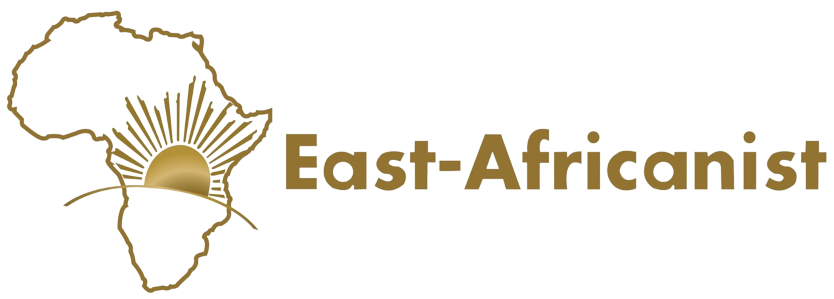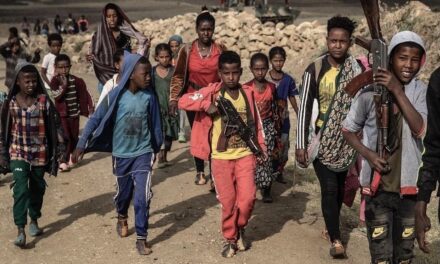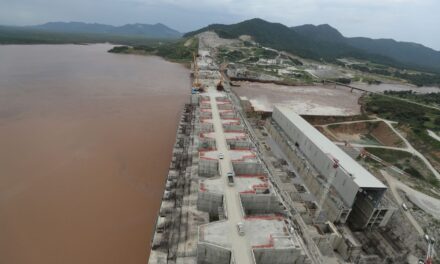By: Mengesha Kebede (Mengesha has BA and MA from the American University of Beirut, Lebanon)
In today’s Ethiopia, the is no common consensus as to what policy forms should be national priorities following the defeat of the TPLF. I remain concerned that the perpetuation of the conflict and misunderstandings linger beyond the “mission accomplished” pronouncements on the law enforcement operation in Tigray. There is no national consensus as to how to overcome “Tplfism” as the root causes of conflicts raging in various parts of the country, which have resulted in deaths of citizens and massive displacements. Remnants of TPLF and their sponsors also appear to be frantically trying to instigate an insurgency to keep the spirit of “Tplfism” alive.
Some Amhara politicians claim that the law enforcement operation has resulted in the “liberation” of Amhara regions that were forcefully incorporated by the TPLF into Tigray regional state in 1991. The law enforcement operation has seemed to have effectively resulted in the redrawing of the Amhara state boundaries with the Tigray state. The other similar outstanding claims for the redrawing of boundaries between all components of the ethnic federation throughout the country remain a time bomb set to explode as the country floats in a state of limbo in the face irretraceable conflicts.
Some Oromo activists appear to be welcoming the defeat of the TPLF militarily but want “Tplfism” to continue as they see the philosophy legitimizing their grip on power. Such Oromo activists even suggest that their turn to rule as the dominant party with the largest population group has now arrived. This category of politicians insist that the constitution of the EPRDF, particularly the ethnic partitioning of the country into ethnic enclaves has to be preserved at all cost.
It is widely accepted that superficial Marxist-Leninist slogans and concepts have been adopted by the TPLF to facilitate its rule in Ethiopia and draw national and ethnic boundaries primarily to benefit its party core membership.
The class struggle and call for “land to the tiller” progressive Ethiopian stood for had long been hijacked by ethnocentric opportunists who use ethnicity to further their narrow political goals. Ethnic federalism has been presented as being an institutional choice to alleviate an alleged ethnic exploitation and rule by the Amhara. Ethnicity has been developed as an ordering principle in the establishment of a political system structured along ethnic lines in order to mobilise a population group for political advantage. However, complete ethnic homogeneity is rarely found within any territory of multi-ethnic Ethiopia. As a result, new minorities have been created within each state who feel in danger of being victimized, and continue to demand for their own subunits. The other dimension to the conflict is the evection or ethnic cleansing of those defined to be different or not belonging to that ethnic group that dominates a given state or sub region.
The problem is that a system that defines politics along ethnic interests which in turn transforms everything into an ethnic issue is established. The prevailing federal system continues to ethnicize group identities and give rise to or exacerbate, instead of alleviating, ethnic conflict at the subnational level. The power-sharing arrangements at the centre tend to lead to paralysis, while politicians or parties representing the different groups seek to enhance their political position by refusing compromise or trying to outsmart the others. The change from EPRDF to Prosperity Party with the exclusion of the TPLF and the inclusion of other regional parties does not necessarily change the situation as the rule of the game remains the same.
The federal structures has also enabled the regional groups to build up economic, political and, even more worryingly, military strength that could lead ultimately to the collapse of the nation under ethnic tensions and demands. The monopoly of military power by the centre has been compromised in various ethnic states. Citizens continue to be encouraged to identify with the regional subunit rather than the federation as a whole, thus threatening the unity of the state and ultimately the nation.
Ethnic federalism is inherently flawed and incompatible with democracy as it drags most political and economic debates down to the level of ethnicity. Ethiopians, like all people, have concerns and values that reach far beyond this limited category. It will not be easy or quick but there is an urgent need for progress towards a new cosmopolitan Ethiopian identity and politics.
The Law Enforcement and Ethiopian Nationalism
The law enforcement operation in Tigray has once again demonstrated the existence of Ethiopian nationalism which transcends narrow ethno-nationalism. This had been also observed during the Ethio-Eritrean border war (1998-2000). All ethnic groups have been involved in large numbers to join the war effort in one way or another. Tragic as it is, the law enforcement conflict, nonetheless, has demonstrated a genuine and high degree of pan-Ethiopian nationalism among members of diverse ethnic backgrounds. The top leadership of the country as well as Ethiopian political parties and civil society should capitalise on that development.
Removal of the TPLF and replacing it in Tigray with either a caretaker transitional governance mechanism or the Prosperity Party branch functioning within the former EPRDF constitutional, territorial and administrative confines cannot be a long term solution. The various conflicts raging in the country are not isolated and unexpected crises. Rather, they are logical outcomes of a system based on competing ethno-nationalisms that rewards regional homogeneity and increases the salience of ethnic identity.
Launching an ongoing law enforcement operations in various parts of the country under the guise of bringing to justice TPLF allied proxy actors that are terrorizing the population and involved in ethnic cleansing might be necessary but will not ultimately address the root cause of the problem.
The End of Ethnic Federalism
The resolution of the ongoing conflict in Ethiopia is doing away with root cause, which is the ethnic-federalism. A rationally worked out decentralised federal management would be better suited for the governance of Ethiopia. It is therefore time to begin a process of incremental reform with the long-term aim of dismantling the entire system of ethnic federalism.
The constitutional order has to be reconfigured so that Ethiopia’s regions were instead defined according to geographic features or other administrative criteria, the hope is that citizens’ sense of belonging as Ethiopians would be foregrounded. By delinking ethnicity and territory, state boundaries could allow for the formation of regional identities that cut across — rather than reinforce — ethnic divides. It would also require local and national politicians to represent multi-ethnic constituents.
One action to be taken in this endeavour is to amend the constitution. Article 47, which allows any ethnic groups to form its own regional state subject to a request and referendum, should be changed to put in greater barriers to demands for autonomy. Article 39, which asserts that “Every Nation, Nationality and People in Ethiopia has an unconditional right to self-determination, including the right to secession”, needs to be removed entirely. More broadly, Ethiopia’s constitution would have to focus on citizens civil and human rights over ethnic self-determination and prioritise individual over group rights. Every citizen should be treated equally under the law and chose to reside and earn a living anywhere in the country.
A shift to a territorial system would not require the creation of a new map overnight. Instead, it could involve a process of examination into how existing states could be broken up, redrawn, or even renamed based on criteria that is not exclusively ethnic. The leadership of each levels of governance within the state will be based on local elections. Elections have to be more than an ethnic head count, which is a recipe for ethnic conflict.
The replacement of ethnicity with geography as the organising principle of national politics could still allow space for multi-cultural policies a local levels. Measures could be taken to preserve the rights of ethnic groups to conduct local politics, maintain and build on their cultural heritage and education in regional languages.
There is the need to embark to strengthen social and political bonds that cross groups and that opportunity exists with the merger of the three regional parties in the former EPRDF with the five other regional ruling parties. The Prosperity Party opens up a possibility to move away from the EPRDF’s history of ethnic patronage and exclusion. The PP needs to work on its party discipline and adherence to a coherent policy and party programme.
There is also a need to forge a national identity that is distinctly Ethiopian. There are many places to start and nationalism is on the rise and the momentum should not be lost. Ethiopia is rich in history and culture and it remains the only African nation never to be colonised, possesses unique scripts and literature, indigenous practices of democracy, and a long tradition of religious pluralism. These could be the building blocks for a shared story. The fact that ethnic groups have for centuries being intermarried and the mixed category constitutes the majority of citizens needs to be brought to the front.
Presidential system
The new constitution to be developed could also shift the country to a presidential form of governance. The presidential system to be established will be based on the central principle of the legislative, executive and judicial branches of government being kept separate.
A presidential system based on universal suffrage will be the basis of the election of the Head of State of the new federal Ethiopia. By this method, the president receives a personal mandate to lead the country from the entire country. The current system under the Prime Minister only receives a personal mandate to represent a constituency or an alliance of constituencies.
The presidential systems operating in a jurisdiction with strong ethnic or sectarian tensions will not ignore the interests of minorities or even treat them with contempt. The presidential systems ensure that minority wishes and rights cannot be disregarded, thus preventing a “tyranny of the majority” and vice versa protect the wishes and rights of the majority from abuse by a legislature or an executive that holds a contrary viewpoint especially when there are frequent, scheduled elections That means a president can only be elected independently of the legislative branch.
A Pragmatic Vision
Prime Minister Abiy is unlikely to completely abolish the system that brought him to power overnight and alienate his largely pro-ethnic federalism Oromo political base. However, he appears to be committed to reinforcing national unity and Ethiopianism. His desire to stay in office coupled with his appeal to a broad base of the general public makes him the pragmatic choice to lead the country forward. His Prosperity Party as a successor to the Ethiopian People’s Revolutionary Democratic Front (EPRDF) has been presented as a merger of each component into a countrywide party as part of Abiy’s general policy of distancing the country’s politics from ethnic federalism. That party needs to work on its coherence as a national force and clear itself of elements that do not see beyond their ethnic interests.
By transforming the PP into an all-inclusive, pan-Ethiopian, national party, Abiy can create a political force that could bring an end to all these problems and ensure Ethiopians have the option to elect a governing party that represents all of them as citizens with equal rights over the entire country. The building of a national defence force that transcends party politics is yet another feather in Abey’s hat.
Actually, a PP government could strengthen, not damage, Ethiopia’s new administrative federal arrangement. If a national party with a wide base takes control of the federal government, the states that did not previously have full representatives in the EPRDF would finally get a say in the central government’s policies, which would increase their commitment to the federal order.
As regional states learn to work together under the umbrella of an all-inclusive central government as equal partners, a true and fair federalism can finally emerge in Ethiopia. Furthermore, once in government the PP would have the opportunity to protect the rights of individual citizens against the actions of regional states and ethnic groups. The PP should immediately work on the redesigning of boundaries that is not rigidly based on ethnicity but administrative and geographic considerations.
All in all, the PP could be the political force of Ethiopia to start the second phase of its political transformation. If Prime Minister Abiy manages to convince his critics to give the party a chance and ensures that it does not become a new vessel for the ethnic political elites to consolidate their power, the establishment of the PP could be a cornerstone in Ethiopia’s journey towards becoming an enviable democracy where its diverse peoples live in peace, unity and prosperity.
As the PP is expected to run for the first time in the 2021 general election throughout the country, Abiy needs to be encouraged and supported in the rejuvenation of the Ethiopian spirit.
<p value="<amp-fit-text layout="fixed-height" min-font-size="6" max-font-size="72" height="80">Opposition political leaders should start shaping political dialogue by extolling the civic values of liberty, tolerance, transparency and development over ethnic identity. Getting the population out of poverty should take center stage. Ethiopia deserves a better political system than fatal obsession with ethnocentric federalism. Opposition political leaders should start shaping political dialogue by extolling the civic values of liberty, tolerance, transparency and development over ethnic identity. Getting the population out of poverty should take center stage. Ethiopia deserves a better political system than fatal obsession with ethnocentric federalism.




